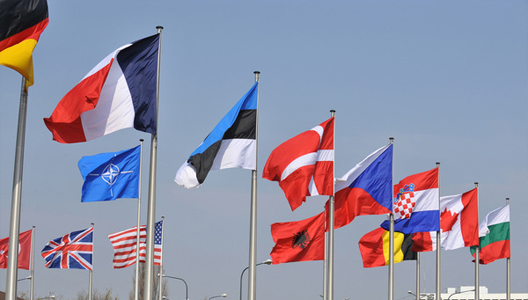 NATO currently finds itself in a period of transition of strategic importance. The combat mission in Afghanistan, which has pre-occupied the Alliance for over a decade, is slowly but surely coming to a close, while transatlantic austerity has triggered significant cuts in defense budgets and a near-mad scramble to find ways to do more, or at least as much, with less across the transatlantic community. Indeed, it is a reasonable guess that the 2014 NATO Summit in the UK will focus intensely on these two transitions.
NATO currently finds itself in a period of transition of strategic importance. The combat mission in Afghanistan, which has pre-occupied the Alliance for over a decade, is slowly but surely coming to a close, while transatlantic austerity has triggered significant cuts in defense budgets and a near-mad scramble to find ways to do more, or at least as much, with less across the transatlantic community. Indeed, it is a reasonable guess that the 2014 NATO Summit in the UK will focus intensely on these two transitions.
| This blog is based on the recently released Issue Brief Global Trends and the Future of NATO: Alliance Security in an Era of Global Competition authored by Barry Pavel and Magnus Nordenman. The Issue Brief is part of the larger project “NATO in an Era of Global Competition,” a joint effort by the Atlantic Council and the Norwegian Institute for Defense Studies. |
It is, however, important for NATO’s long-term viability that the Alliance and its members start considering the future global context of transatlantic security, and what major drivers and trends will help shape the future global security environment. Major global developments, including the rise of Asia, emerging technologies, and shifting demographics are afoot, and NATO must start thinking about them now to be prepared to face the future beyond Afghanistan.
Even though Europe does not border the Pacific, the transatlantic community has major security stakes in the rise of Asian powers and their future trajectories. While it is perhaps unthinkable that many European nations will ever deploy military power to the Asia-Pacific region, that does not mean that NATO will not be affected by the emergence of new global security actors. Indeed, a contingency in Asia involving the United States and Canada (the two NATO members with a Pacific coast) could very well emerge as a matter for NATO under its Article V.
Furthermore, as Asian nations gain power and resources they are likely to project power beyond their borders and neighborhoods in order to advance their interests and underpin relationships with key countries and regions. The Arctic and the Middle East are two key regions with transatlantic interests at stake where Asian nations almost certainly will play a larger role in the coming decades as military and security actors. Interestingly, China and India, among others, were recently given observer status on the Arctic Council.
Shifting demographics, with ageing populations in the west and a youth bulge across North Africa and the greater Middle East, could be a twin challenge for the transatlantic community. Moreover, ageing populations in Europe could require additional public resources, putting additional strain on defense budgets across the Alliance. How do you fully man a military with qualified personnel with a diminishing recruiting pool? On the other hand, the youth bulge in the greater Middle East could very well contribute to turbulent decades in that region (especially in combination with diminished food, water, and energy resources), much like what is currently occurring in the context of the Arab Awakening. This could result in long-term and recurring instability that NATO will be forced to respond to in myriad ways.
Finally, the pace of development of disruptive technologies is hardly slowing, and could enable individuals and small groups to use force in ways previously reserved for states. Furthermore, disruptive technologies also allow state adversaries to quickly gain new military capabilities, obviating NATO’s current edge in conventional warfighting which is underpinned by technology. Indeed, history contains numerous examples of the lesser military power besting otherwise superior militaries by leveraging innovative uses of technology.
These are merely a few examples of the trends currently driving global change and remaking the world. NATO will not be immune to their effects. Using foresight and extended strategic planning to anticipate likely future scenarios, NATO could very well assure its vitality and success for decades to come. If, on the other hand, the Alliance and its members squander this opportunity for long-range thinking, it could very well, to use the words of then-Secretary of State Hillary Clinton, “slide into military irrelevance.”
